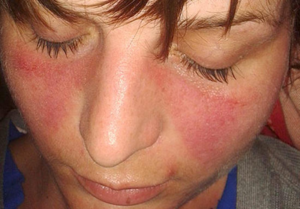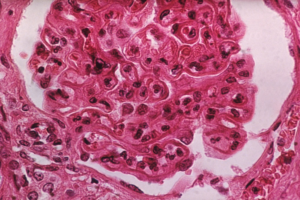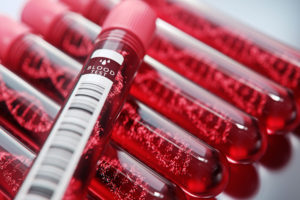Bay Biosciences provides fresh frozen (-80C) high quality clinical grade sera (serum), plasma and peripheral blood mononuclear cells (PBMC) biofluid samples processed from patient’s whole-blood using customized clinical protocols from unique untreated Systemic Lupus Erythematosus (SLE) patients.

Systemic Lupus Erythematosus (SLE) Overview
Systemic Lupus Erythematosus (SLE) Symptoms can vary and can change over time. Most common symptoms include anemia, blood clotting, severe fatigue, headaches, hair loss, joint pain, swelling, rash on the cheeks and nose. Other symptoms depend on the part of the body the disease is attacking.

Signs and Symptoms of Systemic Lupus Erythematosus (SLE)
The signs and symptoms of Systemic Lupus Erythematosus can vary from person to person, and may come and go, depending on what part of the body is affected, can be mild, moderate, or severe. Some patients have just a few symptoms, while others have many, can vary and change over time. Diagnosis can be difficult because lupus mimics many other diseases; it requires clinical and serologic criteria.
Common SLE symptoms include:
- Severe Fatigue
- Joint Pain
- Joint swelling
- Headaches
- A rash on the cheeks and nose, which is called a “butterfly rash”
- Hair Loss
- Fever
- Anemia
- Mouth sores
- Photosensitivity
- Inflammation of the membranes that surround the lungs (Pleuritis)
- Inflammation of the pericardium which is the fibrous sac surrounding the heart (Pericarditis)
- Blood Clotting Issues
- Fingers turning white or blue and tingling when cold, which is known as Raynaud’s phenomenon
Other symptoms depend on the part of the body the disease is attacking, such as the digestive tract or the skin. Other symptoms can include sun sensitivity, oral ulcers, arthritis, lung problems, heart problems, kidney problems, seizures, psychosis, and blood cell and immunological abnormalities.
Causes of Systemic Lupus Erythematosus (SLE)
The cause of SLE is not clearly known. It’s thought to be the result of a mix of genetic, hormonal and environmental factors. For example, the immune system makes proteins called antibodies that fight infection. In lupus, the body also makes autoantibodies that are similar, but attack the body’s own tissues instead (autoimmune), It is unknown why this happens. There are some factors that probably make this more likely:
- An illness or infection
- Strong sunlight
- Hormonal changes, such as during puberty
- Smoking cigarettes
- Certain medications, this is known as drug-induced lupus, and this usually gets better when patients come off the medication that caused it.
Lupus isn’t directly passed on from a parent to their children, but if you have a close relative with lupus then you may be at increased risk of developing it.
Systemic lupus erythematosus (SLE) is more common in women than men by nearly 10 to 1. It may occur at any age. However, it appears most often in young women between the ages of 15 and 44. In the US, the disease is more common in African Americans, Asian Americans, African Caribbean’s, and Hispanic Americans. Lupus isn’t contagious, so you can’t catch it from anyone else.
Diagnosis of Systemic Lupus Erythematosus (SLE)
Systemic lupus erythematosus (SLE) is a difficult disease to diagnose, because its symptoms can be vague. And unlike some other diseases, it cannot be diagnosed with a single lab test. Usually SLE is diagnosed by the doctor using symptom assessments, physical examination, X-rays, and lab tests. SLE may be difficult to diagnose because its early signs and symptoms are not specific and can look like signs and symptoms of other diseases. SLE may also be misdiagnosed if only a blood test is used for diagnosis. Because diagnosis can be challenging, it is important to see a doctor specializing in rheumatology for a final diagnosis. Rheumatologist is a doctor who specializes in treating joint and soft tissue disorders and autoimmune diseases.
No one single test is diagnostic for SLE, but screenings that can help your doctor come to an informed diagnosis include:
- Blood tests, such as antibody tests and a complete blood count (CBC)
- Urinalysis test
- Chest X-ray
Following diagnostic tests may be performed to confirm Systemic Lupus Erythematosus:
- Antinuclear Antibody (ANA): ANA is a type of antibody directed against the cells’ nuclei. ANA is present in nearly everybody with active lupus. Doctors often use the ANA test as a screening tool.
- Antiphospholipid Antibodies (APLs): APLs are a type of antibody directed against phospholipids.
- Anti-Sm: Anti-Sm is an antibody directed against Sm, a specific protein found in the cell nucleus.
- Anti-dsDNA: Anti-dsDNA is a protein directed against double-stranded DNA. DNA is the material that makes up the body’s genetic code.
- Anti-Ro(SSA) and Anti-La(SSB): Anti-Ro(SSA) and Anti-La(SSB) are two antibodies that are commonly found together. They are specific against ribonucleic acid (RNA) proteins.
- C-Reactive Protein (CRP): CRP is a protein in the body that can be a marker of inflammation
- Complement: Complement proteins are involved in inflammation. The test can look for levels of specific complement proteins or for total complement.
- Erythrocyte Sedimentation Rate (ESR): ESR measures the speed of red blood cells moving toward the bottom of a test tube. When inflammation is present, blood proteins stick together and fall and collect more quickly as sediment. The more quickly the blood cells fall, the greater the inflammation. ESR is used as a marker of inflammation. Inflammation could indicate lupus activity. This test could be used to monitor inflammation, which could indicate changes in disease activity or response to treatment.
- Complete Blood Cell Count (CBC): CBC is a test to measure levels of different blood cells. Abnormalities in blood cell counts, including white blood cells and red blood cells, may occur in people with lupus. This may be related to the lupus, lupus treatments, or infection. For example, leukopenia, a decrease in the number of white blood cells, is found in about 50% of people with lupus. Thrombocytopenia, or a low platelet count, occurs in about 50% of people with lupus, as well.
- Chemistry Panel: A chemistry panel is a test to assess kidney function and liver function. It also gives information on electrolytes, blood sugar, cholesterol and triglyceride levels. Abnormalities may indicate the development of complications from lupus. They could also result from treatments for such conditions as kidney disease, elevated blood sugar levels, elevated cholesterol levels, and liver disease.
- Glomerular Filtration Rate: A glomerular filtration rate measures how effective the kidneys are at filtering the blood to eliminate waste products. It can be found in a blood work report. The GFR is a calculation that includes creatinine level, age, gender, race, and weight. It shows the stage of a person’s kidney disease.
Urine Tests for Lupus
Besides blood tests used to diagnose and monitor lupus, doctors use urine tests to diagnose and monitor the effects of lupus on the kidneys. These tests include the following:
- Urine Protein/Microalbuminuria. These tests measure the amount of protein (or albumin) in urine. Even a small amount may indicate a risk for kidney disease.
- Creatinine Clearance: This test measures how effective the kidneys are at filtering the blood to eliminate waste products. It is conducted on urine collected over a 24-hour period.
- Urinalysis: Urinalysis can be used in screening for kidney disease. The presence of protein, red blood cells, white blood cells, and cellular casts may all indicate kidney disease.

Detailed clinical data and pathology annotations including Systemic Lupus Erythematosus (SLE) patients corresponding diagnostic test values, antibody biomarkers, ANA, anti-dsDNA, Sm, RNP, PCNA are provided to a valued pharmaceutical customer for research, development and discovery.
Bay Biosciences is a global leader in providing researchers with high quality, clinical grade, fully characterized human tissue samples, bio-specimens and human bio-fluid collections from cancer (tumor) tissue, cancer sera (serum), cancer plasma, cancer PBMC and human tissue samples from most other therapeutic areas and diseases.
Bay Biosciences maintains and manages it’s own bio-repository, human tissue bank (biobank) consisting of thousands of diseased samples (specimens) and from normal healthy donors available in all formats and types. Our biobank procures and stores fully consented, deidentified and institutional review boards (IRB) approved human tissue samples and matched controls.
All our human human tissue collections, human specimens and human bio-fluids are provided with detailed samples associated patient’s clinical data. This critical patient’s clinical data includes information relating to their past and current disease, treatment history, lifestyle choices, biomarkers and genetic information. Patient’s data is extremely valuable for researchers and is used to help identify new effective treatments (drug discovery & development) in oncology, other therapeutic areas and diseases. This clinical information is critical to demonstrate their impact, monitor the safety of medicines, testing & diagnostics, and generate new knowledge about the causes of disease and illness.
Bay Biosciences banks wide variety of human tissue samples and biological samples including cryogenically preserved -80°C, fresh, fresh frozen tissue samples, tumor tissue samples, FFPE’s, tissue slides, with matching human bio-fluids, whole blood and blood derived products such as serum, plasma and PBMC’s.
Bay Biosciences is a global leader in collecting and providing human tissue samples according to the researchers specified requirements and customized, tailor made collection protocols. Please contact us anytime to discuss your special research projects and customized human tissue sample requirements.
Bay Biosciences provides human tissue samples (human specimens) from diseased and normal healthy donors; including peripheral whole-blood, amniotic fluid, bronchoalveolar lavage fluid (BAL), sputum, pleural effusion, cerebrospinal fluid (CSF), serum (sera), plasma, peripheral blood mononuclear cells (PBMC’s), saliva, Buffy coat, urine, stool samples, aqueous humor, vitreous humor, kidney stones, renal calculi, nephrolithiasis, urolithiasis and other bodily fluids from most diseases including cancer. We can also procure most human bio-specimens and can do special collections and requests of human samples that are difficult to find. All our human tissue samples are procured through IRB approved clinical protocols and procedures.
In addition to the standard processing protocols Bay Biosciences can also provide human plasma, serum, PBMC bio-fluid samples using custom processing protocols, you can buy donor specific sample collections in higher volumes and specified sample aliquoting from us. Bay Biosciences also provides human samples from normal healthy donors, volunteers, for controls and clinical research, contact us Now.
日本のお客様は、ベイバイオサイエンスジャパンBay Biosciences Japanまたはhttp://baybiosciences-jp.com/contact/までご連絡ください。
